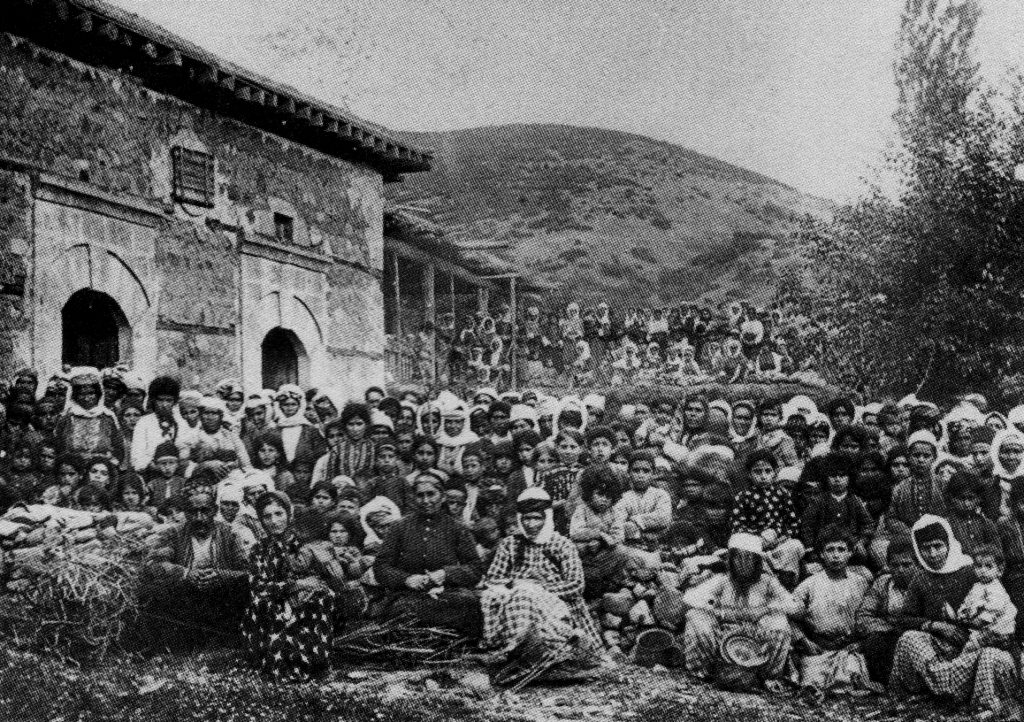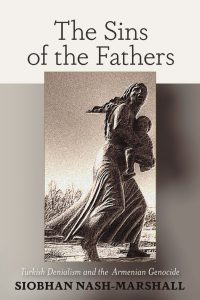The Sins of the Fathers: Turkish Denialism and the Armenian Genocide
By Siobhan Nash-Marshall
The Crossroad Publishing Company, New York (Jan. 1, 2018), 256 pp.
ISBN: 978-0824599164; Paperback, $24.95

Special to the Armenian Weekly
Denial is not only the last stage of genocide but also the first. One need merely recall that the diplomatic representatives of the Ottoman Empire in Geneva and New York were denying the annihilation of Armenians in real-time, clinging to the arguments of negation and rationalization that the first denialist pamphlets would go on to compile as early as 1916-1917.
The denialist project in the West was on a low simmer in the 1950s and 1960s, until it gained impetus in the 1970s from the struggle over the mention of the Armenian case in the report on genocide by the now-defunct U.N. Sub-Commission on the Promotion and Protection of Human Rights (known as the Sub-Commission on Prevention of Discrimination and Protection of Minorities before 1999). From then on, denialism has only increased in intensity while also shifting tactics. The crude falsification of evidence has yielded to semantic games, and diplomatic pressures have been matched by academic outfits creating alternative narratives and manufactured controversies invoking freedom of speech.
The Sins of the Fathers: Turkish Denialism and the Armenian Genocide, a recent book by Siobhan Nash-Marshall, chair of Christian philosophy at Manhattanville College, makes a case study of Turkish denial of the Great Crime (Medz Yeghern) as part of a trilogy on the betrayal of philosophy.
That the book is written by a philosopher should not predispose the layperson. Its approach is as instructional as it is philosophical, and the book is infused with extensive and learned historical research. The book’s starting point is familiar to many readers: a somewhat old yet ageless document of moral bankruptcy—evidence unwittingly provided by denialism itself—that disclosed the murky alliance between state sponsorship and academic servility. The reference is to a 1990 letter addressed by Nüzhet Kandemir, then Turkish Ambassador to the United States, to professor Robert Jay Lifton of City University of New York. The missive was extraordinary… and thrice revelatory: The letter itself, its actual source, and the explanation from the source each disclosed inner workings of Turkish denialism. As a result of a clerical error, the letter to Lifton had also included both the initial draft of the letter, actually crafted by historian Heath Lowry (a star of the denialist firmament in the 1980s and 1990s), as well as Lowry’s explanatory cover letter to Kandemir.[1]
Lowry, who also ghostwrote the infamous 1985 letter to the U.S. Congress signed by 69 Turkish Studies scholars and published in the New York Times and the Washington Post as an advertisement, produced a string of denialist articles and books and went to become Princeton University’s first Ottoman and Modern Turkish professor (1993-2013) in a chair funded by the Turkish government, where he resumed his field of specialization, Early Ottoman Studies.[2]
In her introduction, professor Nash-Marshall points to the split between the realm of experience and the realm of thought, as suggested by Descartes, which led to the rationalist approach of the French Encyclopedists and that of the German idealists “to remake the world in the image and likeness of their ideas”—namely, to overturn the world and reshape it without concern for the destruction of human lives and cultures (p. xii). This approach, which underlies the failure and the betrayal of modern philosophy, inspired readers of those philosophers, like the Young Turks and Hitler, to do the unthinkable: “In all seriousness, anyone who knows twentieth-century history should realize that he cannot make sense of the unimaginable amount of blood spilt throughout it and in most corners of the globe without referring to philosophers… The twentieth century was the playground of nineteenth-century philosophy” (p. 27).
After dealing with those issues in Chapter One, the author takes the bull of denial by the horns in Chapter Two, in which she deals with the inherent violence of denial as much more than just the reshaping of history. It is fair to note here that the issue of denial has been specifically analyzed by various authors (Vigen Guroian, Richard Hovannisian, Vahakn Dadrian, Marc Nichanian, Marc Mamigonian, Henri Theriault, etc.), and extensively noted by many others. Thus, either an account of past analysis or a footnote that listed the main sources on the subject would have been a welcomed addition.

Nash-Marshall makes an illuminating point when she observes that the Armenian case is unlike that of post-Holocaust denial in that the writings of denialists Robert Faurisson or David Irving are not a constituent part of the genocide they deny occurred (p. 48-50). That is, they do not contribute to the genocide; they merely feed off of the intra-genocidal denial that took place during the Shoah itself, when the Nazis contrived euphemisms such as “Final Solution” for their plans and “disinfecting showers” for their actions, or the way they disguised conditions in concentration camps (e.g., Theresienstadt) to deceive curious outsiders.
However, as she explains in Chapter Three, Ambassador Kandemir (and his ghostwriter Lowry) in 1990—and by extension any other denialist before and after them, whether they feed from the original denial or not (one of the “sins of the fathers”)—have an objective that is directly related to the project that the Committee of Union and Progress (CUP) pursued in 1915 and subsequent years (p. 57-65).
The creation of a homeland only for the Turks, which was the primary goal of the CUP from 1908 onward, was hampered by the near nonexistence of a Turkish identity that could serve to create a Turkish nation-state or buttress the ideology of Turkish superiority and right of dominance. In Chapter Four, Nash-Marshall extensively draws on the memoirs of that champion of Turkish feminism and purported progressive Halide Edib (Adivar), who was actually a close collaborator of the Young Turks and director of the infamous factory of Turkification that was the orphanage of Antoura, in Lebanon. In her memoirs, Edib provided extensive textual information about what Turkish foundational identity was, where the Turkish homeland would be, and how the CUP would ensure the adoption of that identity by the inhabitants of the new homeland. Professor Nash-Marshall offers a penetrating and illuminating deconstruction of Halide Edib’s memoirs as a key for understanding the subjacent ideology and purposes of the Ottoman ruling elite (p. 74-100).
The author invokes in Chapter Five what she calls the Greek Principle (“the inalienable right of an autochthonous [indigenous] people to the proprietorship of the lands of their forefathers”) (p. 105) that led to Greek independence in 1822. This principle came about as the result of a paradigm shift in the sovereignty of peoples in the late 1790s and early 1800s, and it served as the guiding pattern for the effective dismantling of the Central Empires (Germany and Austria-Hungary) after World War I. It undermined imperial land claims, above all the Ottoman Turkish claims, for they had no “lands of their forefathers” to demand. The elimination of the word “Armenia” in article 61 of the Treaty of Berlin (1878) was an early response to that threat (p. 111), followed by Abdul Hamid II’s widespread prohibition of “Armenia” in print [including from Ottoman maps] and the rejection of Armenian demands for reform that echoed the 19th century’s European democratic revolutionary trends (p. 119-122). And it is not surprising that Ottoman documents in the late 19th century considered Anatolia (including Western Armenia) “the crucible of Ottoman power” (p. 123), and justified the Hamidian massacres (1896-1897) as maintaining the integrity of the state in light of Armenian “provocations.”

The Young Turk coup d’état of 1908 did not stop the process of disintegration of the empire after the independence of Greece; that process had gained momentum in the fourth quarter of the 19th century, and as a result Ottoman presence in Southeastern Europe and North Africa was practically wiped out between 1911 and 1913. The disintegration process was perceived to be poised to engulf the empire’s Asiatic domains, and the menace to the “Anatolian heartland” (the current territory of Turkey) seemed more than palpable. The CUP’s understanding of what the “Great Democratic Revolution” and the Greek Principle had in store for the fate of that core territory led it to find a preemptive “final solution” to counter those threats by creating a “Turkey for the Turks” and exerting the “sovereign right of self-defense against a revolutionary movement,” as the Ottoman government claimed in its response to the Allied statement of May 24, 1915 that referred to “crimes against humanity and civilization.”[3]
Chapter Six of The Sins of the Fathers offers a nuanced account of how the situation evolved in the postwar period, from the Armistice to the Treaty of Lausanne. It elucidates the impact of Western political incoherence on the success of the Kemalist movement to attain the goal of its forerunner, the CUP: to salvage a much larger Turkish state than the one the Treaty of Sevres had carved out from the Asiatic territory, and make it practically identical with the boundaries of the “Anatolian heartland” with the reincorporation of the Armenian territories that had been wrested by the Russian Empire after the Russo-Turkish war of 1877-1878 (p. 161-204).
Once that territorial re-composition had been achieved, the ideological engineering begun by the Young Turks continued: Mustafa Kemal tried to “invent an identity that would not just unite the Turks, and demonstrate that they were not culturally inferior to the Europeans, but above all ensure that no autochthonous people could threaten their claims to their lands” (p. 209). That in turn required doing what in fact was carried out: destroying the rem(a)inders of material culture; renaming the geographical places that recalled non-Turkish presence in those lands; dismissing the non-Turkish groups as remnants from the forgettable dark ages of Turkey; and, as a corollary, denying what had been perpetrated.
In her Conclusion, professor Nash-Marshall states that Kandemir’s letter to Lifton was a paradigmatic example of genocidal act—as intellectual aggression against Armenian collective memory; an echo of CUP propaganda at the time of the Genocide; and “the product of an act that aimed to eliminate not just a geno’s past right to existence, but the foundations of its future existence” (p. 212). Its underlying reason was the defense of the territorial integrity of a Turkish state inextricably linked to the seizure of the indigenous people’s properties, and their very land, both of which constituted the underpinnings of modern Turkey’s socioeconomic construction—and of the Turkish state itself.

However, that seizure was not simple confiscation, in that “the CUP and its successors firmly believed (and believe) that what was once called Armenia—the Eastern Provinces or six vilayets and Cilicia—is and can only be Armenia” (p. 220). The lack of links among origin, history, and geographic location made it impossible for Ottoman Turks to apply a binding agent between the prospective Turkish homeland and the peoples who would live on those lands. The solution for that lack was the destruction of the indigenous peoples, carried out through the two-fold crime: their physical annihilation, and the erasure of the remaining traces.
It is not by chance, then, that a 2007 Turkish court ruling against two Armenian journalists charged with violating provisions of the notorious Article 301, stated (as quoted by the author), “Talk about genocide…may lead in future centuries to a questioning of the sovereignty of rights of the Republic of Turkey over the lands on which it is claimed these events occurred” (p. 222, italics added). That conceptualization, the author points out, makes of the annihilation of 1915 rather than “just a historical fact…a present crime that continues to be perpetrated by every official act with which the Turkish government denies the truth” (p. 223).
Nash-Marshall returns in her final paragraph to the ideas presented at the beginning of her work: The subordination of reality to our thoughts and will turns our actions violent. In the case of the Armenian Genocide, the actions and policies of the Turks, Soviets, Central Powers, and Entente, and all the way down to the actors of today, were and are informed by the imposition of expediency and national interests over moral commitments: “All do so because they make metaphysics serve their policy instead of informing it” (p. 226).
The Sins of the Fathers makes a well-considered and informed case about many issues that seem to have been overlooked in historical analyses of the Armenian Genocide and its denial. It does so with refreshing candor and scholarly depth. Above all, it gives plenty of fodder to rethink many issues of yesterday that bear enormous weight over what is happening today.
Notes
[1] The documents were published and analyzed in Roger W. Smith, Eric Markusen, and Robert Jay Lifton, “Professional Ethics and the Denial of the Armenian Genocide,” Holocaust and Genocide Studies, Spring 1995, 1-22. The article was reprinted in Richard G. Hovannisian (ed.), Remembrance and Denial: The Case of the Armenian Genocide, Detroit: Wayne Street University Press, 1998, pp. 271-296.
[2]Professor Nash-Marshall argues in two lengthy footnotes at the beginning of Chapter One that Lowry reportedly walked back his denialist positions (pages 2-4). We have not seen any concrete evidence to that effect, however.
[3] Professor Nash-Marshall has given the date May 29 for the Allied statement, which is inaccurate (p. 147).


Wonderful, Vartan. Nice to see scholars like Nash-Marsall pumping out the good work that needs to be published.
‘Medz Yeghern’*
Shan’t Be Uttered by Others
Hence ‘Genocide’ and Further Forth
Every Language has a soul
Every language has its own roar
Exhales inside its cavernous core.
Can you learn languages all?
Each language vibrates a soul
From heartiest opened door –
Can anyone translate spiritual soul
To similar inspiring soul? **
Sylva~MD~Poetry
President O.B., should not use a phrase he can’t understand,
He is a poet, judge, lawyer, he must be criticized.
Medz Yeghern for us, are two horrible words
Not everyone can realize
Something more than Calamity, Massacres,
Tragedy, Disaster and even worse than Genocide,
Which sounds still little!
‘A Killing Plague’
Deep painfulness can create endless
Anguish phrases, lexicons …
Not felt with everyone yet to be invented . . .
Affected and still affecting
Lives of our cohorts
Like the end of the world
Hence translation has no meaning at all
Maybe for others, thus never for sufferers’ prose.
The word ‘calamity’ seems an ant
Facing a starving tiger . . . lion
A phrase can’t treat torments.
Can any human beings translate
What’s in their deep, scorned-minds
How much they love their mothers . . . yev
Their lost motherland?
So please Dr. President,
Calm your bemused sense.
Don’t behave tenaciously.
Don’t sell your philosophy
On the graves of seared lives.
Don’t please your and our enemies,
Don’t pretend to be deaf to what is really bleeding
Under the rain and on the streets sunken in blood,
To run your shiny-wheeled political cart!
Don’t enunciate a phrase as
You did with your vocal cords.
But can never pronounce thru your chest
As you never walked with hungry, bare injured soles,
On the hot, arid, desert rocks.
Did the criminal gendarmes’ assaults,
They enjoyed smashing humans’ vital organs,
Drive you to an unknown destiny
Near red-rivers filled with bones,
To see smashed innocent faces from your blood with
Crushed lacrimating eyes outside prayers’ skulls.
Tell me, “How can you feel the pain
Of something you have never faced or felt!”
How can you utter
That horrible phrase?
Please O.B. understand that
‘We Love You’—
{‘Ge sirenk kez’—©—‘Kez ge sirenk’ }
We are not here to insult someone
Who made us promises and said that was
“A Real Genocide”;
Don’t act like a lover who changed his promise
Because of another who betrays and fires fears.
Your promise stagnated in our hearts.
We heartlessly weep . . . We can only say,
“Also you, the son of darling, sweet, senseful
Stanley~Ann, betrayed us
Why?”
Each time we hear
‘Medz Yeghern’
We can witness pointed, poisoned Turkish scimitars
Entering our already fear-filled,
Scared heart-cells,
Depressed glial cells
Tearing our creed.
Regretful . . .
That we possess
So naïve-sincere-soulful-faith!
Not every race could
Sincerely grace!
Thus, Please, President O.B.,
don’t cheat yourself
by repeating time after time
‘Medz Yeghern!’
June 19, 2010, modified on February 13, 2018
*Medz Yeghern: Armenian phrase used by President Barak Obama on the
Armenian Genocide Remembrance Day on April 24, 2010, instead of
using the word Genocide he used word ‘calamity’ just after four
months from inauguration day on April 24, 2009.
But he had clearly said the word Genocide before inauguration!
“Armenian Genocide is not an allegation, a personal opinion, or a point of view,
but rather a widely documented fact supported by an overwhelming
body of historical evidence, the facts are undeniable.“
As a senator, I strongly support passage of
Armenian Genocide Resolution
(H.RES.106 and S.RES.106),
and as a President,
I will recognize the Armenian Genocide
(January 19, 2008)
Obama meant to please the second generation of the new-Ottomans in spite
of 45 out of 50 American States recognizing the Armenian Genocide.
(Recently 48 states recognized the Armenian Genocide.)
**The above poem modified from Sylva’s historical poetry collection,
“My Son~My Sun, Chants Ann, Obama’s Mother” (2011)
And will be once again in my historical poetry collection
“BRING OUT our Genocided Skulls &Artful Hands” (April 2018)
Prof. Nash-Marshall is correct. The date of the State Dept. telegram is May 29, 1915. The telegram stated that the date the French government asked to issue a joint statement was May 24, 1915.
“When on May 29, 1915, in a joint declaration, the Allied Powers (France, Britain, and Russia) stated their intent to hold the leaders of the CUP criminally responsible for the extermination of the Armenians–their “crimes against humanity and civilization”–…” (The Sins of the Fathers, p. 147). Needless to say, my footnote 3 corrected the reference (quoted above) to the Allied joint declaration in French on May 24, 1915 in French that used “crimes against humanity and civilization.” Only the footnote to the statement (“RG59, 867.4016/67”) referred to the source: the May 29 cable of the State Dept. to Henry Morgenthau laconically stating “French Foreign Office requests following notice be given Turkish Government” before the text of the May 24 declaration.
In response to your second footnote: It seems the purpose of Nash-Marshall’s extensive footnotes on Lowry are not to suggest that he “walked back” on his previous statements denying the Armenian Genocide. Rather the implication is that Lowry knew privately that his statements were false. From Nash-Marshall’s own words on page 3 in footnote 5, “In the most significant part of his private memorandum to Ambasador Kandemir, Prof. Lowry actually refers to the Armenian Genocide as the ‘genocide,’ thereby privately acknowledging that what had happened to the Armenians was indeed a genocide.” This directly contradicts statements Lowry made publicly regarding the Armenian Genocide. Nash-Marshall is catching Lowry in a lie. Therefore, within only the first few pages of her book, she has effectively defined for us what denialism actually is.
I do not agree with Nash-Marshall that Armenian genocide denial is different in essence or purpose from Jewish Holocaust denial. It is often clearly meant to deny Jewish national rights in the present and future.
However, I do agree with her argument that philosophy, the German philosophical tradition in particular, Kant & Hegel first and foremost, readied the ground for the Jewish Holocaust and for German collaboration with the Ottoman Empire in the Armenian genocide.
This article makes that argument:
http://www.acpr.org.il/english-nativ/10-issue/green-10.htm